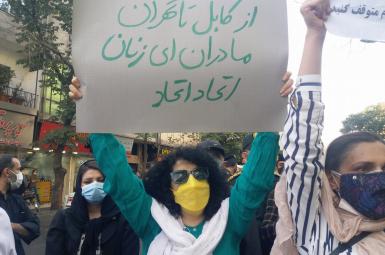
UN Rapporteur 'Shocked By Excessive Lethal Force' Used Against Iran Protesters
Javaid Rehman, UN special rapporteur on the situation of human rights in Iran, says he "is alarmed by the unprecedented violent crackdown against protesters across the Islamic Republic of Iran in November 2019."
The report, which is based on information collected up to June 24 2020, including from the government of the Islamic Republic of Iran, non-governmental and media organizations and individual interviews with victims of human rights violations, their families and lawyers, says "Excessive [use of] force by State security forces has led to hundreds of deaths and injuries and thousands of arrests. Detained protesters have faced torture and ill-treatment, with some receiving harsh sentences, including the death penalty, after unfair trials.
Javaid Rehman criticized the Islamic Republic for its failure to hold perpetrators of human rights violations to account, adding that victims’ families have also reportedly faced harassment by authorities for speaking out.
This is Rehman's third report to the UN General Assembly on the status of human rights in the Iran since his appointment as Special Rapporteur in 2018. He replaced Asma Jahangir after her sudden death in February 2018.
The Iranian government has refused to allow Rehman, Jahangir and her predecessor Ahmad Shaheed to visit Iran to inspect prisons. In fact after a visit by Special Rapporteur for Iran Maurice Copithorne in the early 1980s, Iran never recognized UN Human Rights rapporteurs and categorically accused them of working on behalf of the opposition.
In his report to the UN General Assembly, Javaid Rahman observed that the violent response to the January 2020 protests following the shooting down of Ukraine International Airlines Flight 752 demonstrated that the Islamic Republic continues to use excessive force to suppress freedom of expression and peaceful assembly.
Meanwhile, he called the temporary prisoner releases to mitigate the spread of COVID-19 in prisons "a positive initiative." But the Special Rapporteur said he was still concerned that most human rights defenders, lawyers, dual and foreign nationals and other targeted groups have not benefitted from the initiative.
Rehman said in the Report that he was shocked by the unprecedented use of excessive and lethal force by State security forces during the November 2019 protests, including by the police, the Islamic Revolutionary Guard Corps and its Basij militia, adding that according to credible sources, at least 304 people, including 23 children and 10 women, were killed between 15 to 19 November 2019 in 37 cities across Iran, although he acknowledge that "the death toll is believed to be much higher."
One of the most shocking parts of Rehman's reports is about the treatment of arrested protesters in detention: "The Special Rapporteur is extremely disturbed by reports of denial of medical treatment, torture and other ill-treatment and forced confessions of detained protesters. Video footage that first appeared online on 16 November 2019 shows handcuffed detainees being beaten by security forces at Mali Abad police station in Shiraz. Other reports allege hundreds of protesters, including children, were brought into Raja’i Shahr prison in Karaj on 16 November 2019."
The Special Rapporteur further observed that the detainees were "flogged and beaten on a daily basis, by hand and with batons, while handcuffed and blindfolded." He added that arrested protesters who were wounded by live ammunition during the protests were reportedly transferred to prisons rather than to hospitals.
The report also adds that scores of children were also among those arrested during and in the aftermath of the protests in November 2019 and January 2020.
According to the website of the office of the United Nations High Commissioner for Human rights, Mr. Rehman is a Professor of International Human Rights Law and Muslim Constitutionalism at Brunel University, London. Mr Rehman teaches human rights law and Islamic law and continues to publish extensively in the subjects of international human rights law, Islamic law and constitutional practices of Muslim majority States.








